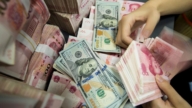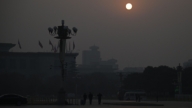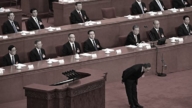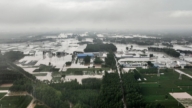【新唐人2013年06月08日讯】中共环保部6月4号发布了《2012中国环境状况公报》,报告承认,中国环境形势依然严峻,因环境污染问题引发的“突发环境事件”也很多。之前中国一些环境污染的真实情况,被当局当作“国家机密”。请看报导。
环保部公报公开的污染情况,令人怵目惊心,还不包括它可能掩盖的真实情况。公报说,按环境空气品质新标准评价,全国113个环境保护重点城市中,空气品质达标只有27个城市,比例仅为23.9%。
另外,在198个城市4929个地下水监测点中,“较差、极差”水质的监测点比例为57.3%﹔而全中国长江、黄河等十大流域,约有30%被“污染”或“严重污染”﹔另外,在监测的60个湖泊或水库中,“富营养化”状态的占25.0%。
此外,报告还说,农村的环境也日益形势严峻,突出表现为工矿污染压力加大,生活污染局部加剧,畜禽养殖污染严重,饮用水源和地表水都受到不同程度污染。
公告承认﹕环境污染问题引发了公愤。去年全中国共爆发542起突发环境事件,包括5起重大突发环境事件,5起较大突发环境事件,532起一般突发环境事件。
民间公益机构“北京益仁平中心”负责人 陆军:“环境,这些年状况其实是每况愈下,而且因为环境污染引发大规模群体事件此起彼伏,而且我们看到大规模群体事件,它的诱发的因素就是政府对环保真实状况的隐瞒。”
去年底,世界权威医学杂志《柳叶刀》发布的《2010年全球疾病负担评估》报告指出,中国在2010年室外空气颗粒物污染,主要是PM2.5导致120万人过早死亡,以及超过2500万健康生命的损失。
美国健康效应研究所(HEI)首席科学家、环境空气污染专家组联合主席亚伦•科恩表示,中国的PM2.5浓度、空气污染导致的疾病负担都是全球最高。
今年1月,中国多个省区出现雾霾天气,几十个城市空气严重污染。当时美国大使馆测得北京的PM2.5读数高达291,被视为“不安全”等级。而中共环保部却对PM2.5忽略监测。
在此之前,环保部还把耗资10亿元人民币、花费五年时间做的土壤污染研究结果列为“国家机密”。
民间公益机构“北京益仁平中心”负责人陆军指出,环保部门还常把民众的知情权当作不稳定因素。
陆军:“在一些职能部门,因为涉及到它自己的政绩,包括维稳的需要,所以它就会拿这个所谓‘国家机密’来去掩盖一些真实的状况,一方面是掩盖它自己失职、渎职,另外是避免不稳定的因素。”
毕业于“北京大学”中文系的作家何哲表示,环境危及世界每个人,中国也应该用国际公认标准,而不只是中共环保部制定的。
美国北大笔会副会长 何哲:“如果采取美国标准、或者联合国制定的一些标准—-就是已经公布的,不是机密的公开资料,已经是严重的污染,已经是危害居民的环境。问题是相当严重了。”
2007年世界银行发布的《中国的污染成本》报告指出,水和空气污染的成本高达GDP的5.8%。“中欧陆家嘴国际金融研究院”执行副院长刘胜军在英国《金融时报》撰文指出,中国制造业迅速崛起的背后,是惊人的环境污染。环境污染引发的疾病已经日益显现,随着时间的推移,势必引发更多的社会矛盾,甚至成为社会不稳定的诱发因素。
陆军:“最近这些年政府发展经济的思路就是不惜成本发展GDP,而且往往是牺牲环境做为代价。这种实际上是杀鸡取卵,竭泽而渔的一种发展模式。”
陆军指出,从上到下,中共各级官员只顾自己的政绩和升迁、只顾眼前利益,所以采取这种短视的发展经济模式。这种模式危害极大,所以现在越来越多的公民和一些非政府组织宣导并参与维权行动,而实际上民众的反抗行动也越来越多。
采访/易如 编辑/宋风 后制/周天
*******************************
Chinese Communist Party Releases Official Environmental
Report: A Tough Situation Revealed
On June 4th, China’s Ministry of Environmental Protection
released the state environmental report for 2012.
The report admitted that environmental problems remain
serious in China, leading to many protests and incidents in 2012.
Some facts about China’s pollution problem were previously
kept as “state secrets” by the Chinese Communist Party (CCP).
The report from the Ministry of Environmental Protection
reveals many horrifying facts about pollution in China.
There are probably more facts that are still being covered up.
The report shows that among 113 key cities for environmental
protection, 27 cities, or 23.9% meet the air quality standard.
The statistics from 4929 groundwater monitoring points in 198
cities, show 57.3% have water quality of “poor” or “very poor”.
Among the ten major drainage basins in China, about 30%
of the rivers are “polluted” or “severely polluted”.
Among 60 monitored lakes or reservoirs,
about 25% are subject to eutrophication problems.
The report also talks about the deteriorating
environment in countryside.
The major reasons are worse pollution from mining industry,
domestic living and livestock breeding.
As a consequence, both drinking water and surface water
have been polluted to various extents.
The report acknowledges the fact that many
environmental issues have caused public outrage.
It reports outburst of 542 environmental incidents all over
China in 2012, among which 5 are ranked as “very important”,
5 are ranked as “important” and the rest of 532 are
ranked as “normal incidents”.
Lu Jun, director of a public health charity in China:
”Our environment is really becoming worse these years.
Massive protests have broken out one after another
against pollution problems.
We can see that there is an important fact
leading to those protests.
That is, the CCP is covering up the truth of our environment.”
The Lancet, a famous medical journal, published a report titled
“Global Burden of Disease Study 2010” at the end of 2012.
The article estimates that for China alone, outdoor air
pollution in the form of fine particles (PM 2.5) contributes to
1.2 million premature deaths and over 25 million
healthy years of life lost in 2010.
Dr. Aaron Cohen, Principal Epidemiologist of Health Effects
Institute (HEI) and Co-Chair of the GBD Ambient Air Pollution
Expert Group, had said that China’s PM 2.5 level and burden
of disease due to air pollution are both the highest in the world.
This January, hazy weather covered many provinces of China
with many cities experiencing extremely bad air pollution.
The US Embassy measured a PM 2.5 level of 291, which is
regarded as a “dangerous” level for human health.
On the other hand, the CCP’s Ministry of Environmental
Protection didn’t do any measurement of the PM 2.5 level.
Before that, the Ministry of Environmental Protection also
marked a research report about soil pollution as “state secret”.
It had taken 1 billion Yuan and five years to finish the research.
Lu Jun, director of a public health charity
“Beijing Yirenping Center”, remarked that
the CCP’s environmental regarded
“civil rights to know the truth” as a “factor of instability”.
Lu Jun: ”Some governmental agencies use “state secrets”
to hide the truth because they want to protect their political
positions or “maintain stability”.
So on one hand they don’t want the public to know
about their negligence or dereliction of duty,
on the other hand they try to avoid inducing
any factor of instability.”
He Zhe, a writer graduated from Peking University, believes
that environmental issues involve every single person.
Therefore, China should also adopt global standards in
environmental protection to replace those established by the CCP’s departments.
He Zhe, vice president of Peking University Pen club in US:
“The US standards, or those established by the United Nations are all open to the public.
By using those non-secret standards, we see that
China’s pollution problem has been very, very serious.
It is hazardous to the health of our people.”
According to World Bank’s report
“Cost of Pollution in China” in 2007,
the combined health and non-health cost of outdoor
air and water pollution for China’s economy comes to about 5.8% of the total GDP.
CEIBS Lujiazui International Finance Research Centre Deputy
Director Dr. Liu Shengjun wrote in Financial Times that
behind the rapid rise of China’s manufacturing industry
are horrifying pollution problems that are becoming increasingly apparent;
As time passes more social conflicts will inevitably be induced
and can possibly cause further instability of the society.
Lu Jun: ”In recent years the CCP was seeking GDP growth at all
costs. Many times this happened at the environmental expense.
This mode of economic development is the same as
“catching the fish by draining the pool”.”
Lu Jun remarked that all levels of CCP officials
only care about their own promotions
so they use such a short-sighted mode
only for immediate economic growth;
however, this mode is extremely harmful in the long run.
Now more and more citizens and non-governmental
agencies stand out to protect their rights.
In fact Chinese people are also showing more resistance
against the CCP’s acts.

























